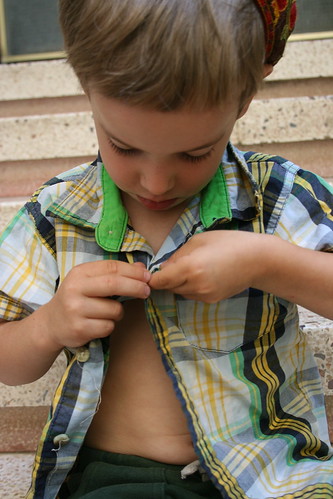Still, I recently read a letter that Gershom Scholem, the renowned scholar of Jewish mysticism sent to his friend, the philosopher, Franz Rosenzweig and which is published in the collection On the Possibility of a Jewish Mysticism in Our Time, in which Scholem says (in an uncharacteriscally overheated sort of way) that "This Hebrew language is pregnant with catastrophe; it cannot remain in its present state -- nor will it remain there. Our children will no longer have any other language... One day this language will turn against its speakers -- and there are moments when it does so even now; moments which it is difficult to forget, leaving wounds in which all the presumtuousness of our goal is revealed. Will we then have a youth who will be able to hold fast against the rebellion of a holy tongue?" What Scholem was exactly worried about, he leaves tantalizingly unspecified, but it seems that it has to do with an inextricable bent towards messianism and eschatology somehow inherent in the Hebrew language itself. Given that you would think that Harry Potter would have a more pronounced messianic or apocalyptic flavour to it in Hebrew than in English but I have to say that in general that is not the case. The translation like the orginal is sort of eerily pelucid. However I found a few oddities. One is the translation of Halloween as "layal hakadoshim" or literaly "the night of the holies." Kadosh, of course has a strong redolence of the biblical and makes the non-religious, magical holiday of Hogworts seem very close to its Christian/Pagan roots. I'm not sure how Halloween general gets translated but I think a transliteration might have been more apposite. Another spot where the language's theology sort of jumped into the driver's seat unexpectedly was when Snape puts Harry on the spot on his first day of Potions class by asking him, among other things the difference between "choneq hazaev" and "bardas hanazir." Now, I have already packed up my dictionary so it is a little hard for me to confirm this but I think the translator -- Gili Bar-Hillel -- has come up with two Hebrew neologisms having translated wolfsbane and
 monkshood more or less literally. Neither variety of aconitum grows wild in Israel as far as I can tell from various plant websites (plant sellers just call them aconitum) so it is not so odd that the translator would simply use a direct translation from the very evocative English common names. But I would imagine that with a little work one could find a Hebrew name in a medieval Hebrew herbology. What is funny about the translation of monkshood to "bardas nazir" is that it relies on imagining the "nazir" as a Medieaval christian monk -- in which case the hood follows naturally and the flower really does look like its namesake. But if your referent for a nazir is the biblical nazir, such as Samson, the "bardas", the hood seems like a bit of a non sequitor.
monkshood more or less literally. Neither variety of aconitum grows wild in Israel as far as I can tell from various plant websites (plant sellers just call them aconitum) so it is not so odd that the translator would simply use a direct translation from the very evocative English common names. But I would imagine that with a little work one could find a Hebrew name in a medieval Hebrew herbology. What is funny about the translation of monkshood to "bardas nazir" is that it relies on imagining the "nazir" as a Medieaval christian monk -- in which case the hood follows naturally and the flower really does look like its namesake. But if your referent for a nazir is the biblical nazir, such as Samson, the "bardas", the hood seems like a bit of a non sequitor.The other day I told Lev that curiosity killed the cat. He said, "Really? How?"
Finally since I have touched on the agricultural and this is really mor or less just for my mom, there was an article in this morning's Haartez about flies, chicken manure and compost, topics all dear to her heart. It also highlights the benefits for people from all over the region to co-operation in this case on ecological issues. I can personally attest that 18 years ago when I was on kibbutz not far from the Jordanian border the flies were Biblical and plague like, though I never thought to blame chicken manure or the Jordanians and I remain skeptical on this point.
| Jordan bans chicken manure as fertilizer over fly infestation | |
| By Zafrir Rinat, Haaretz Correspondent | |
Tags: fertilizer, Jordan  | |
 | |
Jordan has banned the use of chicken manure as fertlizer, as it has been responsible for widespread infestations by flies for many years on both the Jordanian and Israeli sides of the Dead Sea. In future, Jordanian farmers in the Jordan Valley and Dead Sea area will be required to use only compost. Chicken manure both attracts and nourishes flies, and the profusion of the insect has been a blight to life on both sides of the border for years. Recently, authorities in both countries teamed up, with the mediation of the environmental organization Friends of the Earth Middle East, to deal with the problem. | |




